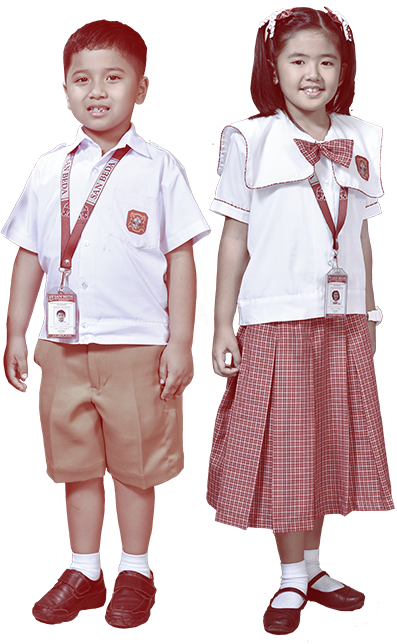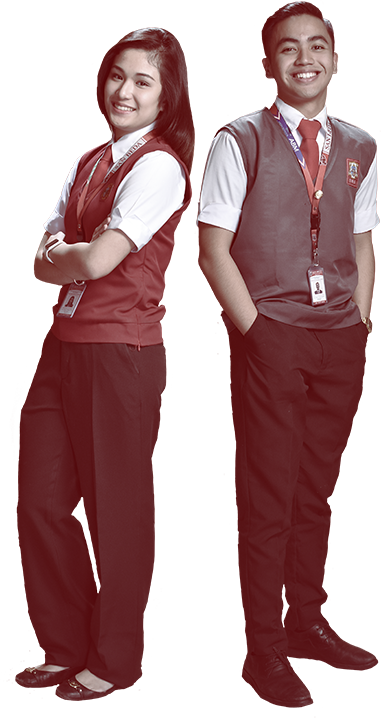The subject Christian Living being the core of the curriculum offers a developmental discovery of God’s magnificence and love in the splendor of His perfect creation. Every learner is taught and developed to become living witness of God’s unconditional love as evidenced in His creation and His Only Begotten Son who was made flesh through the Blessed Virgin Mary. From the basic know-how of the prayers taught by the Church and the sources of truth about the Triune God in the Scriptures, the learner is plunged into a deep sense of being loved by God through the things and people around him. He learns the basic truths about Jesus, about the Church and about the Scripture that may prompt him to respond to God’s call to be of service especially to the least of his brethren.
The subject focuses on the call to know more about God and to love Him in return by loving and serving one’s neighbors especially those who are in need. The learner is expected to recognize his capacity to respond faithfully to this call by the use of his intellect and will, freedom and conscience. In his capacity to appreciate God’s creation, to live a sacramental life, to follow the Commandments, to strengthen his faith through prayerful life, he is expected to live a righteous life and to be of service to his fellowmen.
Furthermore, the learner is challenged to live a holy life amidst materialism and temptations. He is expected not to conform to the present world but to the teachings of the Church and of Christ’s. He defends his faith by prudently doing the right thing and by courageously upholding his Catholic faith even if others seem not to affirm what he believes in. The topics from Kinder to Grade 10 provide a wider perspective of what is it to be a follower of Christ in the context of the Scriptures.
As a learner that belongs to a Benedictine institution, he demonstrates concrete actions of being prayerful, God-fearing, humble, obedient, caring, disciplined, man for others, friendly, and transformed. These Benedictine attitudes are translated in his daily life in school, at home and in the community he is in.
Nakabatay ang kurikulum ng asignaturang Filipino sa Yunit Elementarya sa mga pamantayang pang nilalaman at pagganap na inilahad sa Pinaghusay na Programang K-12. Ayon sa pamantayan ng programa ay inaasahang lilinangin ang paggamit ng wikang Filipino upang madaling maunawaan at maipaliwanag ang mga kaalaman sa araling pang nilalaman, magamit ang angkop at wastong salita sa pagpapahayag ng sariling kaisipan, damdamin o karanasan nang may lubos na paggalang sa kultura ng nagbibigay at tumatanggap ng mensahe.
Naging bahagi ng mga kagamitang pampagtuturo ang paghahanda sa mga mag-aaral sa higit na mataas na baitang ng pag-aaral at gagabay sa kanila sa mga pangyayari sa kapaligiran. Binalangkas ang mga araling pampagkatuto na nakatuon upang taglayin ng mga mag-aaralang kasanayan ng pagiging malikhain sa anumang gawain, mapanuring pag-iisip, epektibong paglahok sa pakikipagtalastasan at pakikipag-ugnayan, at responsableng paggamit ng teknolohiya – mga kakayahang aagapay sa kanila sa pagbabagong bunsod ng ika-21 siglo.
Masasalamin din sa mga tunguhing pang-akademiko ng Kagawaran ng Filipino ang nilalaman ng Bisyon at Misyon ng Kolehiyo ng San Beda at sa tema ng bawat taong panuruan na nakatuon sa paglinang ng mga Palatandaan ng Pagsasabuhay ng mga Aral-Benedictino.
The curriculum aims to equip the learners with the knowledge and skills pertinent to basic Physical Education activities. It takes up lessons and drills that promote fitness, body movements, basic stunts and rhythmic activities, sports, lead – up games and exercises that will provide meaningful activities towards active and healthy lifestyle. The learners build on these knowledge and skills in order to plan, set goals and monitor their participation in physical activities to respond to the 21st century challenges.
The contents, lessons and activities of the Physical Education are anchored in the school’s vision – mission that guides the students to live out the Benedictine values. With their physical abilities demonstrated and shared, they live an active life geared towards fitness and lifelong health. This will pave the way to creativity, collaboration and social growth that make them better individuals.
The Science Curriculum is in consonance with the Department of Education’s spiral progression covering Matter, Living Things and Their Environment, Force, Motion and Energy and Earth and Space. With the aim of developing the 21st Century Skills where pupils are critical and creative problem solvers, responsible stewards of nature, innovative/inventive thinker, informed decision maker and effective communicator and collaborator, they can make judgments and decisions regarding application of scientific knowledge that may have social, health, or environmental impacts.
The Bedan education instills in its pupils the Benedictine way of life that is indicated through its 10 Hallmarks. That while developing the critical thinking, problem-solving and decision-making skills, the Science curriculum also, develops and inculcates Stewardship, Discipline, Humility and Stability among many others.
Different teaching strategies and approaches are employed in the realization and attainment of the said skills and values: inquiry-based, problem-based or issue-based learning, learning by doing and discovery learning to name a few. Science process skills are also developed through the conduct of laboratory activities where pupils perform laboratory experiments and accomplish worksheets to report findings and write conclusions. Each level highlights an increasing level of science process skills.
Technology and Livelihood Education (TLE) curriculum develops learners to acquire the 21st Century skills (creativity, collaboration, communication, critical thinking, cross cultural, computing, Information and Communications Technology (ICT) and career self-reliance) and prepares them for higher education, middle-level skills development, employment and entrepreneurship. It also enables pupils to contribute to the global community through practical use of skills.
Computer Education challenges the pupils to become globally competitive through the use of Technology in understanding and gathering information from different sources in a borderless environment. Aside from the life skills developed in the curriculum, obedience, discipline and stewardship as Benedictine Hallmarks plays a vital role in all learning areas of TLE. Following instructions and procedures strengthens a Bedan’s sense of involvement and respect to all members of the community.
Music Education is a learning area that provides pupils with avenues of self-expression. They are encouraged to express their ideas, show their skills and talents freely through the varied activities given to them. The offering of Music Education establish and enhance the pupils’ ability to learn and acquire the different music skills through varied activities. These also help the pupils develop their thinking skills and confidence as well as transferring visual symbols into creative sound, expressive movements, foster creativity through individual and group activities, manifest dynamism and experience joy their shared experiences as a community. It also enriches their ideas on the richness of our Filipino culture. It fosters the pupils’ appreciation of the different genre of music. It also contributes to the emotional, social, cultural, and spiritual development to inspire every pupil to be fully human and live as a true follower of Christ.
Mandarin is offered to the Grade 1-6 classes to provide young pupils opportunities to learn the basic concepts of the Mandarin language. They are taught how to count, greet, and communicate in simple Mandarin dialogues. This is to prepare the learners to equip themselves with skills that are needed in the 21st century in the context of being globally competitive.
Through this Mandarin curricular offering the learners acquire the basic knowledge, concept and skills in communicating foreign language. This offering promotes global linkages, appreciation and respect of other cultures particularly Chinese culture.
Mathematics of Grade School is a skills subject which focuses on quantities, shapes and figures, numbers and number sense. It is also a tool of science and a language complete with its own notations and symbols and “grammar” rules, with which concepts and ideas are effectively expressed.
In response to the call of 21st century, the curriculum provides opportunities for pupils to be able to interact, communicate, and collaborate through different classroom activities. It also aims to develop critical thinking, computing skills and use Information Communication Technology by solving both routine and non-routine problems. The curriculum also gears towards improving pupils’ creativity and innovation skills through the different tasks provided for them. It also aids learners to understand different cultures in the different scenarios as shown in their performance tasks which guides them to experience the possible job or career they might have in the future.
The curriculum is primarily anchored in the School’s Vision – Mission and the Benedictine Hallmarks. The Christian dimension is always part of the daily discussion to ensure that whatever they learned merely be used for a good purpose and for serving others.
The Grade School English Curriculum features the systematic relation of thinking, learning, language and values of the learner to define a culture vital in communicating his thoughts and action to make meaning. It integrates grammatical competence, language fluency and proficiency, academic vocabulary, information technology and appreciation of literary texts through appropriately challenging literacy-learning activities. These facets facilitate the 21st century learners to foster critical thinking,creativity and to bring about concern and love for God's creations as they strengthen their listening, speaking, reading, writing and viewing skills to build on their language experience.
Approaches employed in the English subject are performance task-based, integrative, interdisciplinary and collaborative with activities that enhance multiple intelligences, heightened societal and environment consciousness, cultural heritage and realizing the School's Vision-Mission goals and objectives and hallmark of Benedictine education.




